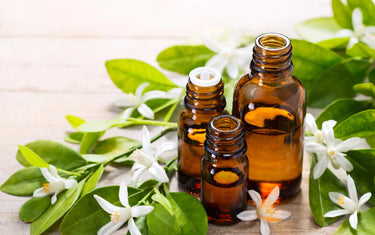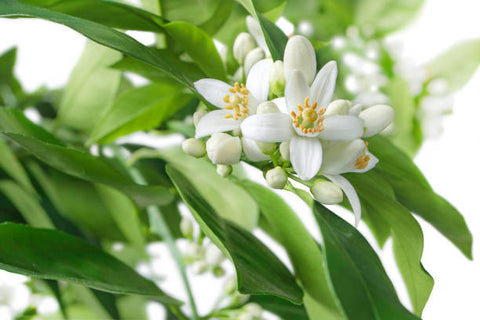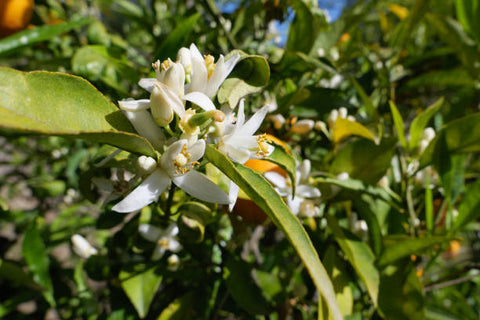8 min read / 6 December 2023 / yasmin sharp
8 Benefits and Uses of Neroli Oil
Fragrant neroli has long-standing associations with royalty and luxurious living.
Share this post

Neroli is a beautiful and delicate essential oil and a firm favourite in aromatherapy circles, with its bright, sweet aroma cherished by people all across the world.
It is estimated that around one thousand pounds of handpicked orange blossom flowers are needed to produce a bottle of pure Mediterranean Neroli oil, which explains why it is so closely associated with luxury and comfort.
Only the highest quality, undamaged blooms are used to make neroli oil, with producers ensuring they are completely undamaged before entering the extraction process.
To understand more about the benefits of neroli oil and how it can help your physical and mental wellbeing, we look at its history, scientific research, common uses and more.
What is neroli oil?Neroli essential oil is extracted via steam distillation from the white blossoms of the bitter orange tree, which is native to southeast Asia. Once extracted, the oil is pale yellow in colour, possessing a light, floral scent with notes of citrus and rich sweetness. Its beautiful natural aroma sees it frequently used in cosmetic products, with its natural properties making it particularly potent when used as a skin tonic. This explains why neroli essential oil is so often associated with luxury and youthfulness, helping to revitalise and refresh the look and feel of skin. |
How does neroli oil work?
Neroli oil can help the body and mind in lots of different ways, with people benefiting from its natural properties using aromatherapeutic and topical applications.
When diffused and inhaled, neroli essential oil can help to reduce stress and anxiety.
Inhaling directly from the bottle or burning the oil in a diffuser can encourage the brain to release serotonin and reduce cortisol levels.
Topical application of neroli oil allows its natural anti-inflammatory properties to ease swollen skin and irritation, whilst some studies have suggested that it can even regenerate skin cells.

Benefits of neroli oil
The benefits of neroli oil are enjoyed by people around the world, as many believe it can:
1. Offer pain management
People who struggle with swollen muscles, joints, and tissues may find that neroli oil can help to reduce any associated inflammation and pain.
According to a study published in 2015, [1] neroli essential oil can work as a pain management agent, reducing central and peripheral sensitivity to pain, making it harder for the body to register pain.
In another study [2] involving women in the first stage of labour, researchers found that neroli oil was able to limit their experience of pain, whilst also lowering feelings of anxiety.
You can test the pain management benefits of neroli oil by diluting it with a carrier oil and applying a small amount to the affected area, whilst making sure to avoid broken skin.
2. Control blood pressure and pulse rate
The calming qualities of neroli essential oil are well known with many cultures using it as an aphrodisiac due to its ability to calm nerves and improve confidence.
Researchers took a closer look at these qualities [3] in a 2012 study, finding that when neroli was used as part of an aromatic blend it was able to reduce both diastolic and systolic blood pressure.
This helped to ease pressure on the heart and in arteries between each heartbeat.
More research is needed to establish the effects of using neroli oil to lower blood pressure, but the initial scientific results offer hope for the future.
3. Improve skin health
One of the most common uses of neroli oil is as a skincare lotion, with the oil being mixed with a carrier oil or blended with a skincare cream before application.
In 2012, the Pakistan Journal of Biological Sciences [4] offered substance to claims of the oil’s skincare benefits, whilst a host of other studies have also provided similar evidence.
Neroli oil contains astringent properties that can increase the elasticity of the skin, helping to make it look and feel brighter and more youthful.
Its ability to regenerate skin cells possibly explains why so many people use it to smooth wrinkles and clear stretch marks.
There are also suggestions that neroli oil benefits the skin by removing harmful bacteria and other forms of skin irritation.
4. Help menopause symptoms
The stress-relieving benefits of neroli essential oil mean it can decrease diastolic blood pressure, whilst also improving the pulse rate.
Researchers also found it helped to balance serum cortisol levels and oestrogen concentrations.
This is based on a 2014 study [5] that stated the inhalation of neroli essential oil helped to improve symptoms of postmenopausal women.
In conclusion, researchers found that neroli oil can lower stress in postmenopausal women and increase libido.
Other studies [6] have also demonstrated that neroli essential oil can decrease a variety of premenstrual (PMS) symptoms, including pain and discomfort, bloating and mood swings.
5. Control convulsions and seizures
Although human studies are yet to be conducted, initial animal studies suggest that neroli oil could help to reduce convulsions and seizures.
Tests were carried out by researchers in 2014, [7] finding that the major components of neroli oil were linalool, linalyl acetate, nerolidol, E,E-farnesol, α-terpineol and limonene, which were likely responsible for the anticonvulsant activity.
More research is required in this area to determine the full potential of neroli oil as an anti-seizure and convulsion agent before it can be suggested for medicinal use.

6. Lower stress and anxiety levels
The stress-relieving qualities of neroli essential oil are well established, with many cultures using it as an aphrodisiac due to its ability to calm nerves and improve confidence.
The neroli-based aromatic blend was also able to decrease salivary cortisol levels, a ‘stress hormone’ that can play a key role in lowering and increasing anxiety levels.
You can use a diffuser or oil burner to disperse neroli essential oil into the air at home, which can create a peaceful, calming atmosphere to regain control when overcome with stress or anxiety.
7. Reduce acne breakouts
In the aforementioned study published in the Pakistan Journal of Biological Sciences, researchers also found that the chemical composition of neroli was able to reduce the appearance of acne.
The limonene compound – along with several other components – proved to be very effective at combating yeast, bacteria and fungi, which could mean it may be able to reduce acne breakouts on the skin.
To put these neroli oil benefits to the test, mix with a carrier oil and gently apply to the skin using a cotton ball and leave it on the skin overnight.
8. Ease hair flakiness and itchiness
The health benefits neroli oil can offer for the skin mean it may also be beneficial for the hair and scalp.
A study published in 2016 [8] found that dandruff could be controlled by balancing bacteria, with neroli oil’s antifungal and antimicrobial properties potentially being able to ease itchy, flaky and dry conditions on the scalp.
You can try this by mixing neroli essential oil with a carrier oil and using it as a hair mask.
Alternatively, add a few drops to your shampoo or conditioner and apply it to your hair as normal.

How to use neroli oil
Some of the most popular neroli oil uses include applying it:
As a massage oil
Because neroli oil benefits the body by reducing inflammation and offering pain relief, it can work wonders as a massage oil.
Dilute 5 drops to 10ml of carrier oil (such as jojoba oil or sweet almond oil) and massage into the skin as needed.
Doing this on the abdomen can also help to ease premenstrual pain and discomfort.
As a bath oil
The benefits of neroli oil can be doubled up as a skincare and aromatherapy treatment by adding it to warm bath water.
The natural properties of the oil soak into the skin, whilst you can relax and unwind as you inhale the sweet-smelling vapours.
Dilute 3-5 drops with a carrier oil and mix well before stepping in and enjoying the uplifting aroma.
History of neroli oil
It’s believed that neroli oil was named for Princess Anne Maria de la Tremoille of Nerola, Italy in the 17th century.
She used the oil to perfume her gloves and bath, although she was far from the only person in high society to hold the oil in high regard.
For example, houses and places of worship were scented with neroli oil by priests and priestesses in Ancient Egypt.
It was a prominent feature in Ancient Chinese wedding bouquets, where eligible Chinese men looking for a wife were said to be ‘gathering orange blossoms’.
Neroli oil was also heavily traded in both ancient China and Egypt, as its medicinal properties were used to treat a host of minor ailments, even going on to help combat the plague.

Neroli oil FAQs
What are the risks of neroli essential oil?
When diluted and used correctly, neroli essential oil is considered safe.
However, as it is citrus-based, avoid exposure to the sun for several hours after application, as it can be phototoxic.
First-time users should also complete a patch test before widespread use, as it can cause irritation or trigger an allergic reaction for some people.
Can you consume neroli essential oil?
You should not consume neroli essential oil, as it could cause serious health complications.
This is true of all essential oils due to their high concentration levels.
Always read the label and instructions in full before applying it topically or as an aromatherapeutic oil.
What other oils does neroli essential oil blend well with?
Neroli essential oil tends to blend well with other essential oils such as sandalwood, lavender, cedarwood, geranium and ylang ylang.
You can create your own topical blend for a skincare treatment or combine and diffuse with an oil burner or diffuser.
[1] Pariya Khodabakhsh et al. (2015) Analgesic and anti-inflammatory activities of Citrus aurantium L. blossoms essential oil (neroli): involvement of the nitric oxide/cyclic-guanosine monophosphate pathway https://pubmed.ncbi.nlm.nih.gov/25762161/
[2] Masoumeh Namazi et al. (2014) Aromatherapy With Citrus Aurantium Oil and Anxiety During the First Stage of Labor https://www.ncbi.nlm.nih.gov/pmc/articles/PMC4102991/
[3] In-Hee Kim et al. (2012) Essential oil inhalation on blood pressure and salivary cortisol levels in prehypertensive and hypertensive subjects https://pubmed.ncbi.nlm.nih.gov/23259002/
[4] A Haj Ammar et al. (2012) Chemical composition and in vitro antimicrobial and antioxidant activities of Citrus aurantium l. flowers essential oil (Neroli oil) https://pubmed.ncbi.nlm.nih.gov/24163946/
[5] Seo Yeon Choi et al. (2014) Effects of Inhalation of Essential Oil of Citrus aurantium L. var. amara on Menopausal Symptoms, Stress, and Estrogen in Postmenopausal Women: A Randomized Controlled Trial https://pubmed.ncbi.nlm.nih.gov/25024731/
[6] Noura S. Dosoky et al. (2018) Biological Activities and Safety of Citrus spp. Essential Oils https://www.ncbi.nlm.nih.gov/pmc/articles/PMC6073409/#B73-ijms-19-01966
[7] Taravat Azanchi et al. (2014) Anticonvulsant activity of Citrus aurantium blossom essential oil (neroli): involvment of the GABAergic system https://pubmed.ncbi.nlm.nih.gov/25532295/
[8] Zhijue Xu et al. (2016) Dandruff is associated with the conjoined interactions between host and microorganisms https://www.nature.com/articles/srep24877










